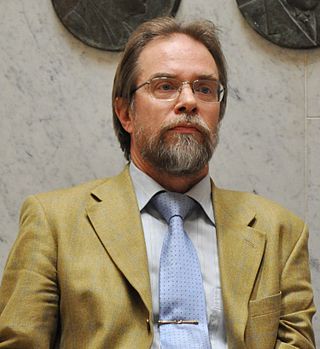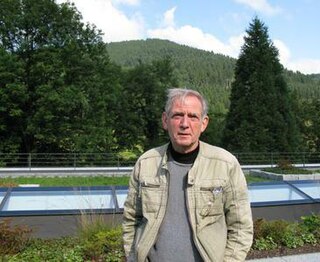Related Research Articles

Alain Connes is a French mathematician, known for his contributions to the study of operator algebras and noncommutative geometry. He is a professor at the Collège de France, Institut des Hautes Études Scientifiques, Ohio State University and Vanderbilt University. He was awarded the Fields Medal in 1982.

Ben Roy Mottelson was an American-Danish nuclear physicist. He won the 1975 Nobel Prize in Physics for his work on the non-spherical geometry of atomic nuclei.

Sumio Iijima is a Japanese physicist and inventor, often cited as the inventor of carbon nanotubes. Although carbon nanotubes had been observed prior to his "invention", Iijima's 1991 paper generated unprecedented interest in the carbon nanostructures and has since fueled intense research in the area of nanotechnology.

Johan Ernst Gunnerus was a Norwegian bishop and botanist. Gunnerus was born at Christiania. He was bishop of the Diocese of Nidaros from 1758 until his death and also a professor of theology at the University of Copenhagen.
Ebbe Schmidt Nielsen was a Danish entomologist influential in systematics and Lepidoptera research, and an early proponent of biodiversity informatics. The journal Invertebrate Systematics was established with significant contributions from Nielsen, and he assisted in the founding of the Global Biodiversity Information Facility (GBIF). Nielsen wrote several books, published over eighty scientific papers, and was highly regarded within the scientific community. Following his death, the GBIF organised the Ebbe Nielsen Prize in his memory, awarded annually to promising researchers in the field of biodiversity informatics. The moth Pollanisus nielseni is named after Nielsen.

Sir John Macleod Ball is a British mathematician and former Sedleian Professor of Natural Philosophy at the University of Oxford. He was the president of the International Mathematical Union from 2003 to 2006 and a Fellow of Queen's College, Oxford.

Henning Larsen, Hon. FAIA was a Danish architect. He is internationally known for the Ministry of Foreign Affairs building in Riyadh and the Copenhagen Opera House.
Simon Asher Levin is an American ecologist and the James S. McDonnell Distinguished University Professor in Ecology and Evolutionary Biology and the director of the Center for BioComplexity at Princeton University. He specializes in using mathematical modeling and empirical studies in the understanding of macroscopic patterns of ecosystems and biological diversities.

Ilkka Aulis Hanski was a Finnish ecologist at the University of Helsinki, Finland. The Metapopulation Research Center led by Hanski, until his death, has been nominated as a Center of Excellence by the Academy of Finland. The group studies species living in fragmented landscapes and attempts to advance metapopulation ecology research. Metapopulation ecology itself studies populations of plants and animals which are separated in space by occupying patches.

Nils Christian Stenseth is a Norwegian biologist with a focus on ecology and evolution. He is the director of the Centre for Ecological and Evolutionary Synthesis (CEES) at the University of Oslo, CEES was given Centre of Excellence status by the Research Council of Norway in December 2006. He is also the Chief Scientist at the Norwegian Institute of Marine Research in Norway, and Honorary Professor of Tsinghua University.

Professor Kurt Lambeck AC, FRS, FAA, FRSN is Professor of Geophysics at the Australian National University in Canberra, Australia. He has also taught at University of Paris and at Smithsonian and Harvard Observatories.
The ECI Prize is a prize awarded annually from 1986 onwards to an ecologist distinguished by outstanding and sustained scientific achievements. It is awarded jointly by the International Ecology Institute, a non-profit organization of research ecologists based in Germany dedicated to fostering ecological knowledge and awareness, and the Otto Kinne Foundation.
Harold A. "Hal" Mooney is an American ecologist and professor in the Department of Biology at Stanford University. He earned his Ph.D. at Duke University in 1960 and was employed by University of California-Los Angeles the same year. He joined the staff at Stanford University in 1968. He is an expert on plants and the functioning of ecosystems from the Tropics to the Arctic. He is a highly cited scientist.
Farooq Azam is a researcher in the field of marine microbiology. He is a Distinguished Professor at the Scripps Institution of Oceanography, at the University of California San Diego. Farooq Azam grew up in Lahore and received his early education in Lahore. He attended University of Punjab, where he received his B.Sc. in chemistry. He later he received his M.Sc. from the same institution. He then went to Czechoslovakia for higher studies. He received his PhD in microbiology from the Czechoslovak Academy of Sciences. After he received his PhD, Farooq Azam moved to California. Azam was the lead author on the paper which coined the term microbial loop. This 1983 paper involved a synthesis between a number of leaders in the (then) young field of microbial ecology, specifically, Azam, Tom Fenchel, J Field, J Gray, L Meyer-Reil and Tron Frede Thingstad.
Marcus Thomas Pius Gilbert is an evolutionary biologist. His work is highly cited, and influential in the fields of palaeogenomics, evolutionary genomics and evolutionary hologenomics. He is currently the director of the University of Copenhagen's Center for Evolutionary Hologenomics
The Royal Norwegian Society of Sciences and Letters is a Norwegian learned society based in Trondheim. It was founded in 1760 and is Norway's oldest scientific and scholarly institution. The society's Protector is King Harald V of Norway. Its membership consists of no more than 435 members elected for life among the country's most prominent scholars and scientists.

Albert Gjedde: is a Danish-Canadian neuroscientist. He is Professor of Neurobiology and Pharmacology at the Faculty of Health Sciences and Center of Neuroscience at the University of Copenhagen. He is currently also Adjunct Professor of Neurology and Neurosurgery in the Department of Neurology, Montreal Neurological Institute, McGill University, Montreal, Quebec, Canada, Adjunct Professor of Radiology and Radiological Science in the Division of Nuclear Medicine, Department of Radiology and Radiological Science, Johns Hopkins University, Baltimore, Maryland, US, Adjunct Professor of Translational Neuropsychiatry Research, University of Southern Denmark, Odense, Denmark, and adjunct professor of psychiatry at Tabriz University of Medical Sciences, Tabriz, East Azerbadjan, Iran.

Jens Kehlet Nørskov is the Villum Kann Rasmussen professor at the Technical University of Denmark. He is a Danish physicist most notable for his work on theoretical description of surfaces, catalysis, materials, nanostructures, and biomolecules.

Ib Henning Madsen is a Danish mathematician, a professor of mathematics at the University of Copenhagen. He is known for proving the Mumford conjecture on the cohomology of the stable mapping class group, and for developing topological cyclic homology theory.

Rebecca Adler-Nissen is a Danish political scientist specializing in international politics, particularly in European integration and the European Union, as well as the relationship between EU and its member states. She is a professor in the department of political science at the University of Copenhagen.
References
- ↑ ISI Highly Cited [ dead link ]
- ↑ "Tom Fenchel | Royal Society".
- ↑ Science Editorial Board Archived August 7, 2010, at the Wayback Machine
- ↑ Ecology - Potentials and Limitations (1987) Full text
- ↑ "Gruppe 5: Biologi" (in Norwegian). Norwegian Academy of Science and Letters. Archived from the original on 10 April 2016. Retrieved 7 October 2010.
- ↑ "Newly elected foreign associates". National Academy of Sciences. Archived from the original on May 7, 2011. Retrieved 14 May 2011.
- ↑ International Plant Names Index. Fenchel.